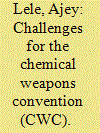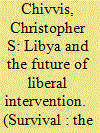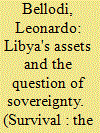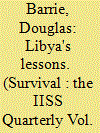|
|
|
Sort Order |
|
|
|
Items / Page
|
|
|
|
|
|
|
| Srl | Item |
| 1 |
ID:
106296


|
|
|
| 2 |
ID:
116646


|
|
|
|
|
| Publication |
2012.
|
| Summary/Abstract |
The tragic assault on the US consulate in Benghazi on 11 September 2012 raised new doubts about the wisdom of the 2011 intervention in Libya. But while the attack put a question mark over Libya's transition, it did not change the fact that the intervention had toppled Muammar Gadhafi and opened the door to a better future for the country. Without it, hundreds, perhaps thousands, of innocent civilians would have died and the wave of rebellion sweeping across the Middle East and North Africa would likely have been slowed. It was a genuine if moderate success for the North Atlantic Treaty Organisation (NATO), for the United States, and most of all for Libya and the Libyan people. Success, however, was the result of no small amount of good fortune, and it could prove very hard to replicate, so before applying its lessons to other cases (above all Syria), it is critical to assess what was and was not accomplished in Libya, and why.
|
|
|
|
|
|
|
|
|
|
|
|
|
|
|
|
| 3 |
ID:
114965


|
|
|
|
|
| Publication |
2012.
|
| Summary/Abstract |
In mid-February 2011, after popular revolts had overturned governments in Tunisia and Egypt, the so-called 'Arab Spring' reached the coasts of Libya. Protests against the decades-long rule of Colonel Muammar Gadhafi broke out in several Libyan cities and quickly gathered momentum, despite the efforts of the country's security forces to contain them. On 27 February, the leadership of the anti-Gadhafi movement, based in the eastern Libyan city of Benghazi, formed an interim National Transitional Council (NTC), which immediately declared itself the sole representative of the Libyan people. But although the uprisings in Tunisia and Egypt were quick and relatively bloodless, in Libya, the confrontation between Gadhafi's regime and the insurgents rapidly turned into an armed conflict.
|
|
|
|
|
|
|
|
|
|
|
|
|
|
|
|
| 4 |
ID:
116645


|
|
|
|
|
| Publication |
2012.
|
| Summary/Abstract |
After the Libyan regime of Colonel Muammar Gadhafi stepped up its military campaign against rebel forces in February and March 2011, in defiance of UN Security Council Resolution (UNSCR) 1970, pressure to impose a no-fly zone - which would require attacking the regime's air defences - began to mount. On 17 March, the Security Council, with China, Russia, Germany, Brazil and India abstaining, passed Resolution 1973 authorising nations to 'take all necessary measures … to protect civilians and civilian populated areas under threat of attack in the Libyan Arab Jamahiriya, including Benghazi, while excluding a foreign occupation force of any form on any part of Libyan territory'. It also imposed a no-fly zone across Libya, and authorised member states to take all necessary measures to enforce it. The resolution did not provide an explicit mandate to provide direct military aid to the rebels, which would probably have provoked a veto from Russia or China.
|
|
|
|
|
|
|
|
|
|
|
|
|
|
|
|
|
|
|
|
|